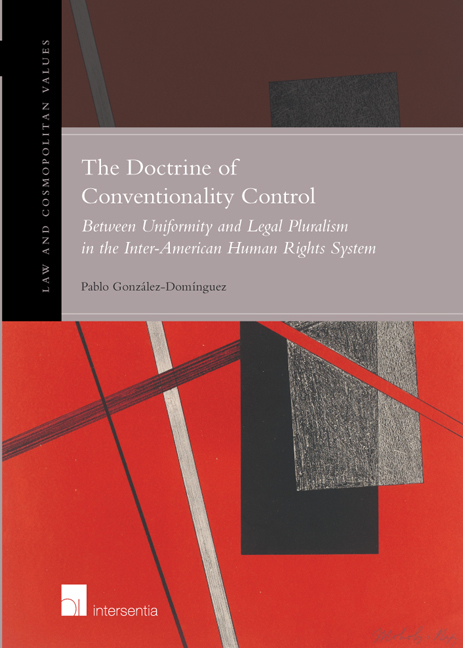 The Doctrine of Conventionality Control
The Doctrine of Conventionality Control Book contents
- Frontmatter
- Foreword
- Acknowledgments
- Contents
- List of Cases and Opinions
- List of Treaties, Instruments and Documents
- General Introduction
- Chapter 1 Jurisprudential Development of the Doctrine of Conventionality Control
- Chapter 2 Legal Analysis of the Doctrine of Conventionality Control
- Chapter 3 Questioning the Legal Validity of the Doctrine of Conventionality Control
- Chapter 4 Reconstructing the Doctrine of Conventionality Control in Light of the Principle of Subsidiarity
- General Conclusions
- Bibliography
- Index
- Miscellaneous Endmatter
Chapter 4 - Reconstructing the Doctrine of Conventionality Control in Light of the Principle of Subsidiarity
Published online by Cambridge University Press: 11 October 2018
- Frontmatter
- Foreword
- Acknowledgments
- Contents
- List of Cases and Opinions
- List of Treaties, Instruments and Documents
- General Introduction
- Chapter 1 Jurisprudential Development of the Doctrine of Conventionality Control
- Chapter 2 Legal Analysis of the Doctrine of Conventionality Control
- Chapter 3 Questioning the Legal Validity of the Doctrine of Conventionality Control
- Chapter 4 Reconstructing the Doctrine of Conventionality Control in Light of the Principle of Subsidiarity
- General Conclusions
- Bibliography
- Index
- Miscellaneous Endmatter
Summary
Principles and rules are intended to provide a thinking man with a frame of reference … a rule or principle of this sort is a law for action, but not in its formal, definitive meaning; it represents only the spirit and sense of the law: in cases where the diversity of the real world cannot be contained within the rigid form of law, the application of principle allows for a greater latitude of judgment.
Carl Von Clausewitz On War, 1832INTRODUCTION
The critiques made of the doctrine of conventionality control could be rejected on the grounds that the interpretation of international human rights norms must be based on principles of justice, as understood by the Inter-American Court and the Inter-American Commission, rather than on the agreement of States as reflected in the text and the travaux préparatoires of the American Convention and other treaties of the Inter-American System. This position – which could be based on the ideas of prominent authors such as A.A. Cançado Trindade – would reflect a strong idealist and monist position that confines the relevance of the sovereignty of States only to the emergence of international obligations at a very abstract level (i.e. with the consent to be bound by a treaty and the acceptance of the jurisdiction of monitoring institutions), and would conceive international institutions (especially the ICtHR) as the ultimate authority to determine and expand the content of the Inter-American Corpus Juris, and of its own jurisdiction, as it considers best for the protection of human rights.
This notion would reflect the conviction that the interpretation of international human rights law (IHRL) must be based in considerations of humanity and not in the consent of States, and for that reason criticism based on positive international law has no place in the Inter-American System.
This chapter rejects both views – the positivist, explained in the previous chapter, and the idealist, explained in the previous paragraph – as solid points of departure to criticize or to sustain the validity of the doctrine of conventionality control.
- Type
- Chapter
- Information
- The Doctrine of Conventionality ControlBetween Uniformity and Legal Pluralism in the Inter-American Human Rights System, pp. 177 - 234Publisher: IntersentiaPrint publication year: 2018
